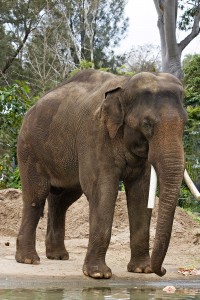 Can you imagine a time when there will be no more elephants on Earth, and when the only way you can see an elephant is actually seeing a picture in a book listing elephants as extinct? It sounds like a nightmare, well, at least to me. However, according to some recent reports, it is quite possible that in the next twenty years, planet’s elephants could become extinct. Elephants are not only magnificent and beautiful animals but they are believed to have complex intelligence and emotions. They laugh and cry and can use tools. So, do we want a world without elephants?
Can you imagine a time when there will be no more elephants on Earth, and when the only way you can see an elephant is actually seeing a picture in a book listing elephants as extinct? It sounds like a nightmare, well, at least to me. However, according to some recent reports, it is quite possible that in the next twenty years, planet’s elephants could become extinct. Elephants are not only magnificent and beautiful animals but they are believed to have complex intelligence and emotions. They laugh and cry and can use tools. So, do we want a world without elephants?
In a recent excellent article by Michael Tomasky in the Daily Beast, he discusses this very important subject and why this is happening. According to Tomasky, the lust and desire for ivory, especially by China and some other Asian countries including Japan, Thailand and Vietnam is driving the illegal poaching and the ivory trade between China and Africa. The vicious trade in ivory could lead to the extinction of the species in twenty years or even less. The number of elephants in Africa has gone from around 1 million to roughly half that in the last 35 years. And the population is falling even faster now according to Tomasky.
Many question the statistics. Last year BBC reported that an estimated 25,000 elephants were killed in 2011 and that the numbers for 2012 were actually higher. We first were alarmed in the 1980s about the rapid loss of elephants and as a result worldwide ban on the ivory trade was enacted by the United Nations Convention on International Trade in Endangered Species (CITES). It worked. Poaching fell off dramatically, and the black market price of ivory dropped. However, many countries in Africa including Zimbabwe, Botswana, and Namibia were permitted a “one-off” legal sale of 108,000 pounds of ivory to Japan. Tusk weights vary a lot, but that’s maybe 1,400 dead elephants according to Tomasky. There was another “one-off” sale in 2002, and then in 2008, the big one: After some aggressive lobbying by China in particular, CITES approved a sale of 110 tons of African ivory to China and Japan (which split it 60 tons to 50, respectively) on the theory that legal sales of large ivory stockpiles might depress the price and thereby slow poaching. The opposite happened—China controlled the supply of legal ivory tightly, which meant the demand was being met by the illegal stock. Today, ivory prices are at record highs, having tripled since that 2008 auction, up to around $1,500 a pound.
Earlier this week the US National Public Radio (NPR), in a program featured a number of African heads of state speaking at the Africa summit hosted by the White House, about their need for “high-tech help” to fight the poachers. “When the four presidents were asked what they need from the United States, the answers revealed how militarily sophisticated the poachers have become,” reported NPR’s Gregory Warner (wrote Tomasky). “Namibia asked for light attack helicopters. Tanzania for night-vision goggles. Togo for infrared scanners to use at its port.”
So who is to blame? Well, according to the reports, everyone, including the US. Obama administration promised in 2008 to create effective enforcement systems for monitoring both tusks and worked ivory. However, it has done nothing. There is also lobbying against a ban for African elephant ivory and one of the major organizations is the National Rifle Association (NRA). It is because there’s ivory in some antique guns.
According to Allan Thornton, the head of the Environmental Investigation Agency, a Washington- and London-based nonprofit that conducts undercover investigations to expose environmental crimes; “They (the US government) really just didn’t have the political commitment to enforce anything,” Thornton says. The good news however is that pressure is building even inside China for a ban. For example, a new celebrity who has lent his name to the campaign is Yao Ming, the former NBA star who’s an icon in China.















